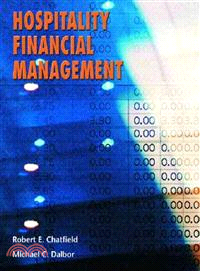HOSPITALITY FINANCIAL MANAGEMENT
商品資訊
商品簡介
For a Financial Management course in a hospitality/tourism management department.
This up-to-date introduction to finance, written for hospitality students, explains and demonstrates the importance of financial management within the hospitality organization. This clear and concise text provides many examples and is primarily based on practical applications and less on theoretical foundations.
Hospitality examples throughout -Tie chapter content to real hospitality companies.
Help students relate material to the real world and feel more comfortable with learning finance.
Practical application perspective -Contains less notation and symbols.
Keeps hospitality students tuned into finance without intimidating them with a typical “finance” book.
Concise -Only twelve chapters long, the first ten sufficiently cover the guts of finance.
Offers students and instructors material that is to the point and leaves less “picking and choosing” of important material for them to focus on.
Discussion questions and problems -In most chapters.
Review and reinforce material covered.
作者簡介
Robert E. Chatfield is professor of finance and director of MBA programs at the College of Business, University of Nevada, Las Vegas. Previously, he was an associate professor of finance at Texas Tech University and an assistant professor of finance at the University of New Mexico.
Professor Chatfield has been teaching financial management for over 25 years and has taught financial management to hospitality students at UNLV for the past 15 years. He has worked as a financial consultant to the gaming industry in Las Vegas. He has also received teaching excellence awards both at Texas Tech University and Purdue University.
Professor Chatfield has been a productive researcher, publishing in a number of leading finance journals, including Financial Management, Journal of Financial and Quantitative Analysis, the Financial Review, International Journal of Forecasting, Journal of Money, Credit and Banking, Quarterly Journal of Business and Economics, and Journal of Economics and Business.
Professor Chatfield enjoys athletics and especially likes to participate in tennis, white-water rafting, and is a novice ballroom dancer.
Michael C. Dalbor is an assistant professor in the William F. Harrah College of Hotel Administration at the University of Nevada, Las Vegas. He holds a B.S. in Food Service and Housing Administration from the Pennsylvania State University and an M.B.A. in finance from Loyola College in Maryland. He also holds a Ph.D. in Hotel, Restaurant, and Institutional Finance from the Pennsylvania State University.
He has published articles in the Journal of Hospitality Tourism Research, the Cornell Hotel and Restaurant Administration Quarterly, the Appraisal Journal, the International Journal of Hospitality Management, and the Journal of Hospitality Financial Management. He is active in the Association of Hospitality Financial Management Education and the Council on Hotel, Restaurant, and Institutional Education. He has worked in various management positions in the hospitality industry, including food and beverage management and as a purchasing agent. He has also conducted numerous market analyses and feasibility studies as a hotel consultant and has been a commercial real estate appraiser specializing in hotel valuation.
目次
1. Introduction.
The Relationship of Financial Management to Other Functional Areas of Management. Organization of the Firm. A Basic Understanding of Financial Management. Wealth Maximization. A General Outline of the Textbook.
2. Financial Markets and Financial Instruments.
Why People Invest. Capital Markets. Money Market. Raising Financial Capital and Security Trading. Financial Markets and Hedging Risk. Key Financial Intermediaries: Lenders to the Hospitality Industry. Stock Market Performance.
3. Review of Financial Statements and Selected Ratios.
Review of the Income Statement. Review of the Balance Sheet. Relationship Between the Income Statement and the Balance Sheet. Statement of Retained Earnings. Statement of Cash Flows. Validity of Financial Statements. Ratio Analysis. Perspectives on and Limitations of Ratio Analysis.
4. The Relationship Between Risk and Return.
How Typical Investors Feel About Risk. Returns and Distributions. Diversification. The Market Portfolio. The Market Portfolio and Beta. Beta, Expected Return and the Security Market Line.
5. Time Value of Money.
Future Value-Compounding. Present Value-Discounting. Future Value of an Annuity. Present Value of an Annuity. Perpetuity-An Infinite Annuity. Present Value of a Series of Non-Constant Cash Flows. Compounding Periods Other Than Annual. Effective Annual Rates. Amortized Loans.
6. Fixed Income Securities: Bonds & Preferred Stock.
Basic Bond Terminology. Bond Features. Bond Ratings. Valuing Corporate Bonds. Computing Yield to Maturity on Corporate Bonds. Bonds with Semi-Annual Coupon Payments. Basic Preferred Stock Terminology. Preferred Stock Features. Valuing Preferred Stock.
7. Common Stock.
Common Stock Features. Valuing Common Stock. General Dividend Valuation Model. Zero-Growth Dividend Valuation Model. Constant-Growth Dividend Valuation Model. Valuing Common Stock with Multiple Growth Rates. Common Stock Value, Investors Rate of Return and Growth.
8. Cost of Capital.
The Weighted Average Cost of Capital. Estimating the Cost of Capital Components. The Cost of Debt. The Cost of Preferred Stock. Internal Common Equity-New Retained Earnings. Dividend Valuation Model Method for Estimating the Cost of Internal Equity. The Bond Yield Plus Risk Premium Method for Estimating the Cost of Internal Equity. External Common Equity-New Issues of Common Stock. Computation of the Weighted Average Cost of Capital. Using the Weighted Average Cost of Capital.
9. Introduction to Capital Budgeting and Cash Flow Estimation.
Classifying Capital Budgeting Projects. The Captial Budgeting Decision and Cash Flow Estimation.
10. Capital Budgeting Decision Methods.
Captial Budgeting Decision Methods. Independent Projects and Capital Budgeting Decision Methods. Mutually Exclusive Projects and Capital Budgeting. Not
11. An Introduction to Hotel Valuation.
Reasons for a Hotel Appraisal. The Hotel Appraisal Process. Approaches to Value. A Rule of Thumb Approach and Revenue Multipliers. Final Reconciliation of Value.
12. Capital Structure.
主題書展
更多書展本週66折
您曾經瀏覽過的商品
購物須知
為了保護您的權益,「三民網路書店」提供會員七日商品鑑賞期(收到商品為起始日)。
若要辦理退貨,請在商品鑑賞期內寄回,且商品必須是全新狀態與完整包裝(商品、附件、發票、隨貨贈品等)否則恕不接受退貨。

























